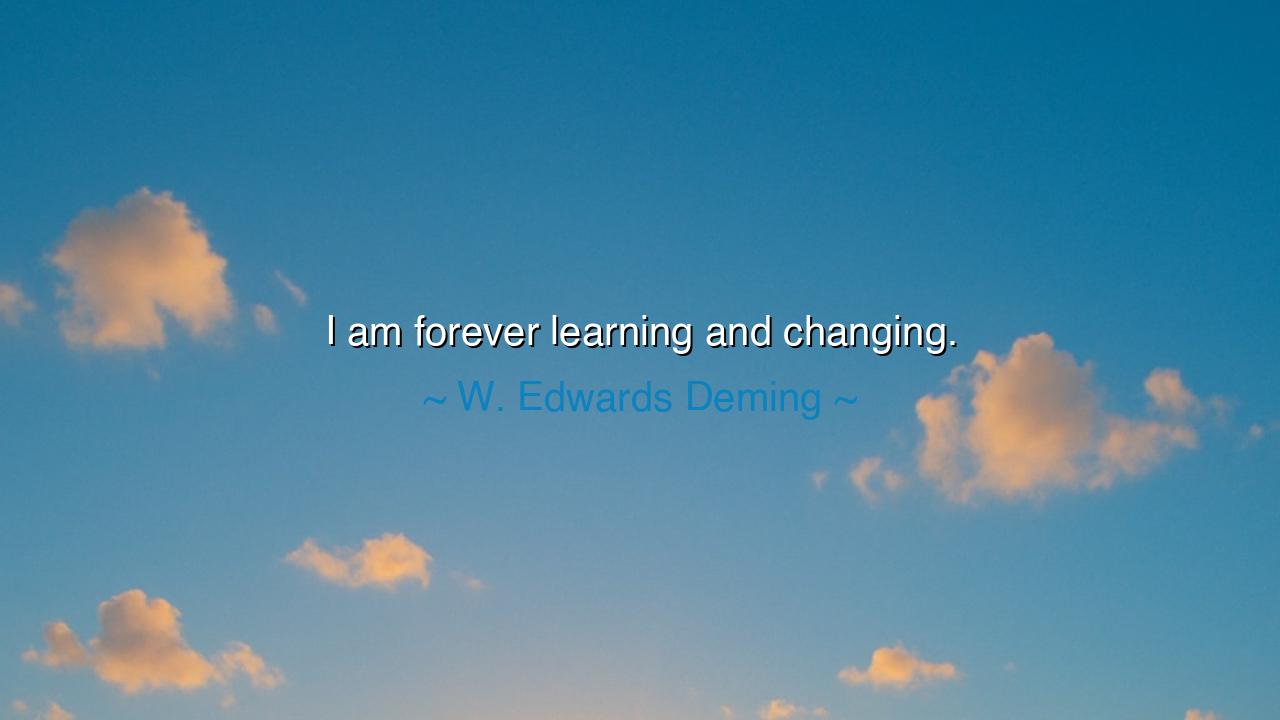
I am forever learning and changing.






When W. Edwards Deming declared, “I am forever learning and changing,” he spoke not only as a scholar of industry, but as a sage of the human spirit. His words are simple, yet within them lies a truth as old as creation itself—that growth is the essence of life, and that stagnation is its quiet death. To learn and to change is to remain alive in mind and soul; to cease doing so is to turn to stone while still breathing. Deming, who reshaped the world of business and manufacturing, understood that the same law which governs the universe—the law of constant evolution—also governs the destiny of man.
Born amid the great transformations of the twentieth century, Deming watched as nations rose and fell upon the strength of their willingness to learn. He brought wisdom to a weary world—teaching Japan, after the Second World War, the art of continual improvement. Through humility, patience, and unending curiosity, he helped a broken country rise from ruin into prosperity. Yet when he spoke of learning and change, he spoke not merely of systems and industries, but of the soul of humanity itself. For he knew that the same discipline that renews factories also renews hearts.
To be forever learning is to admit that one has never arrived, that every truth uncovered reveals another beyond it. It is an act of humility, and humility is the mother of wisdom. The ancient philosophers understood this well. Socrates, when asked why he was considered the wisest of men, answered that he knew only that he knew nothing. It was not ignorance that made him wise, but his recognition of the infinite. Deming’s words carry that same spirit—the understanding that mastery is not a destination, but a pilgrimage.
To be forever changing, likewise, is to live in harmony with the great river of existence. The mountains themselves, though they seem eternal, are born of upheaval; the stars, though they seem unchanging, are in ceaseless motion. How then can man, a child of the cosmos, imagine himself fixed? Change is not betrayal of the past—it is its fulfillment. To cling to what was is to deny the pulse of life itself. As Deming taught, improvement comes only through adaptation; wisdom through revision; strength through transformation.
Consider the story of Japan’s rebirth after the devastation of war. When Deming brought his philosophy of continuous improvement, or Kaizen, to its people, they listened. They changed—not in haste, but in spirit. Factories learned to see flaws as teachers, not enemies. Workers learned to take pride in progress, not perfection. Within a generation, the land once in ashes had become a beacon of innovation. It was not wealth or power that achieved this miracle, but a humble commitment to learn and change forever.
And yet, this teaching extends far beyond the workshop or the marketplace. In every life, there are seasons of failure, loss, and awakening. The wise do not resist these tides; they learn from them. The one who says, “I have learned enough,” is already fading. But the one who whispers, “I am still learning,” remains ever young, ever growing. To change is to breathe anew; to learn is to walk toward the light, step by step, no matter how far one has come.
Let all who hear this truth remember: to live is to learn, and to learn is to change. The mind that stays open is the garden where wisdom blooms. Each day brings a new lesson—if only we have the eyes to see and the humility to receive. The path of learning is long, and the climb of change is steep, but the summit reveals the true measure of the human spirit: not perfection, but progress.
So take this as your guide, child of the future—be forever learning, forever changing. When the world shifts beneath you, shift with it. When the truth you hold is proven small, seek the larger truth beyond. Do not fear the unknown, for it is the teacher of all who wish to grow. And when your life draws toward its end, may you be able to say, as Deming did—not “I have learned all,” but rather, with quiet strength and wonder, “I am still learning, and still changing.”






AAdministratorAdministrator
Welcome, honored guests. Please leave a comment, we will respond soon